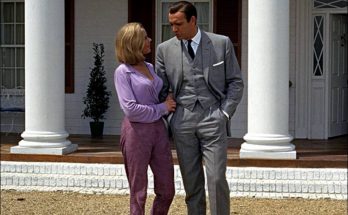Savages: We have to keep the animals in the cage. From Tom Cruise in Born on the Fourth of July and Val Kilmer in The Doors to Michael Douglas in Wall Street and Woody Harrelson in Natural Born Killers, Stone is known for eliciting searing, exceptional performances from his troupe of actors. A keen observer whose idiosyncratic, occasionally provocative approach is in service of performance and story, Stone’s style is referred to by cast and crew as “challenging but fair.”
It was critical to Stone that he select actors who could embrace the kaleidoscopic trademarks of the story’s characters. Indeed, Savages features a sprawling cast, whose intertwining and parallel stories lead up to an explosive climax. Moreover, the battle between the Baja Cartel and Ben, Chon and O exposes complex emotional motivations and frailties in each character. O is not a mere party girl, and Chon isn’t simply a stoic killer. Ironically, Ben the pacifist, when pushed to the brink, is capable of extreme violence. Elena, for all her power and lethal detachment, is maternal and lonely. The methodically brutal Lado lives in fear of his petite female boss, while Dennis, for all his clever machinations, is ultimately a survivor with great loyalty to his family.
Fairly early on in the casting process, Taylor Kitsch landed on Stone’s radar as a potential lead for the thriller. When Stone contacted Kitsch to play Chon, the badass to Ben’s pacifist, Kitsch responded to the material in a very Chon-like manner. “I had read the book before it had been announced that Oliver was involved, but there were rumors that he had optioned it,” Kitsch recalls. “I thought, ‘Man, I would murder to play this guy.’ When I found out that Oliver was attached, well that was it. I felt that I would be a great fit.”
A trained killer and ex-Navy SEAL, Chon uses his skill set in fierce defense of the people whom he loves the most, O and Ben. Kitsch explains the motivation for this character who thinks drugs are a rational response to insanity: “Chon is a guy who has been jaded from day one. He’s seen so much shit in Afghanistan that his first reaction is always to go to violence. You’ll see a different guy when he’s with Ben and O. He can let his guard down with them, maybe even laugh and joke, and that’s rare for Chon. His real purpose in life is to protect Ben and O, and he will kill to do that.”
Discussing his relationship with the director, Kitsch reflects: “Oliver is old- school. It’s all about the work, which I admire. I loved how he would take a break, talk about the scene and work it out. It’s very settling. But you’d better bring your A game. Oliver notices every nuance, even if it’s just a glance. He will question why you’re doing it, which makes you prepare even more. When you do mess up, and everyone has that moment, he will absolutely let you know. But he will also tell you when the take is awesome. He keeps you on your toes, and your performance is better for it.”
Blake Lively plays the beautiful, warmhearted O—a free spirit who, when kidnapped, proves to have just as much grit and fortitude as the Baja Cartel. About his choice for the part, Stone commends: “Blake’s an impressive actress. She was only 23. She had a lot of input into her character and is fearless. Blake has to appear in the movie often in an unflattering light, and she never flinched.”
Lively becomes the voice of Savages, as O narrates the tale, and Stone used the voiceover technique as efficiently and specifically as possible. The director explains: “The idea of O narrating the movie grew naturally from the book, where she tells the story to the reader. But a voiceover in a film can potentially sap it of its tension by making it overly self-conscious. Insofar as the book has more than a hundred scenes and many characters, far more than we can afford in a movie, we worked to minimize the information and still use the voiceover to connect the dots.”
For her part, Lively liked the fact that “O is the one thread that ties everyone together.” Indeed, she interacts in multiple scenes with most of the other actors and had to run the gamut as a performer, and calls the shoot “intense, tumultuous and challenging.” Says the actress: “It was amazing because I got to exist in each character’s world, from this privileged life with the boys in Laguna to being tortured and in cages and being shipped off to Tijuana. It was a challenge to experience so much in a film on so many different levels—from ultimate happiness to ultimate pain.”
The Southern California native was fascinated by the story’s take on a nontraditional family and how three people could love each other that much. Lively offers that she treated O’s story with respect and care: “One of the main reasons that I felt that Ben, Chon and O were together is that they were each other’s family. They were each other’s everything. None of them had real families. They did not have anyone to learn from, no one who was there for them through thick and thin. And they found that in each other.”
Aaron Johnson plays O’s other lover and Chon’s reluctant comrade in arms, the peaceable Ben, who is drawn against his will into a violent conflict with the Cartel. Indeed, Johnson was one of the first actors cast in the movie by Stone…even though neither man was initially sure what role he would play. “Aaron was one of the first actors I met with, in London,” recalls the director. “I thought he was fresh and new. I said, ‘You’re wonderful for this. I don’t know which part I want you to play, but please hold.’ And he did. He passed on a big movie he was very close on, just to stay with us.”
Ben, perhaps more than any of the characters, has to find and accept his inner savage, no easy feat for a self-proclaimed pacifist. “Ben becomes violent,” Stone states. “The irony is that Ben would like to stay out of the muck but he gets in, and once he does he realizes how difficult a dream he had. I guess none of us ever makes it through…we all get pulled into the muck at some point or another.”
Johnson offers that Stone was the reason he accepted whatever role he might ultimately play. When it turned out to be Ben, he was thrilled. “Oliver’s one of my heroes,” the actor shares. “He is a fantastic writer and filmmaker and amazing at putting all the pieces together in original ways. It was incredible to be a part of that puzzle. I’d never played a role close to this, but I had complete trust in Oliver. He is very challenging. He pushes you to do your best, to get to the next level and he always looks out for you. For a part like Ben, where there is a lot of emotional work along with heavy testosterone, Oliver helped me find that balance and strength.”
In addition to his three principals, Stone knew early on during preproduction that he wanted specific actors for the supporting roles. Therefore, he built the rest of the cast around them. They include John Travolta as the corrupt DEA agent Dennis, Academy Award® nominee Salma Hayek as the imperious and ruthless Elena, head of the Baja Cartel, and Benicio Del Toro as Elena’s lethal enforcer Lado.
On both sides of the drug war is Dennis, an affable, manipulative DEA operative. A self-admitted opportunist, he plays fast and loose with Ben and Chon, as well as Lado. Two-time Oscar® nominee John Travolta was brought on to act the part of the agent who has long eschewed his agency’s mission statement. “John was my first choice for Dennis. I’ve wanted to work with him for a long time,” Stone says. “And he projects a good-natured ambivalence, which fits the role of a DEA agent who’s AC/DC.”
It was as much the story as it was the specific part that attracted Travolta to the production. He says: “I responded to the overall impact of the script. I thought it would be a very cool movie, and I wanted to be involved.” Travolta adds that he found Stone to be very welcoming and an appreciative collaborator. “Oliver loved that I have played lots of different characters. He valued my process. That’s very inviting, especially since in a supporting role like Dennis—who connects all the dots in the piece—it was important to feel comfortable. Plus, Oliver had a vision for this movie. I knew that when I stepped onboard. Savages is quintessential Oliver Stone. It has political messages. It has moral messages. It has complications that are current and relevant.”
With two young daughters and a terminally ill wife, Dennis’ complications inform his choices. Travolta reflects: “It was a matter of what can I do to make him understandable, because he is double-dipping in an underhanded way between the U.S. government and the Cartel. But he finds a way to justify the bad things in his life. Like the other characters, he has a vulnerability and a duality to him. Yes, he was doing bad things but he was a human being and sentient, to some degree.”
The biggest prize Dennis could dream of delivering to his supervisors is Elena Sanchez, head of the Baja Cartel who is “negotiating” with Ben and Chon to take over their operation. Hayek offers that she rarely is considered for a role like Elena, the woman who orders O’s kidnapping before she falls for O’s charms. She says: “I don’t get offered villains that much, so Elena was so much fun to play. She’s strong and lives in a world that is violent and scary, and usually men are in her position. It’s daunting and difficult for men but even tougher for a woman, and she’s able to handle it. There is something intimidating, almost royal about Elena. Her nickname is ‘La Reina,’ which means ‘The Queen’ in Spanish. She has to have that presence; she has to command fear and respect. Otherwise the Cartel would never work.”
The actress offers a glimpse into Elena’s world, one devastated by loss: “She suffers a profound personal dilemma that reveals her one weakness, and there are aspects to her that we can identify with. Her Achilles’ heel is her estranged relationship with her daughter, so when O comes into her life, it is a fragile, emotional time for Elena. O brings new light to her life, even though the circumstances that bring them together are not ideal. She’s not completely divorced from humanity, as strong and bad and as cold as she is. That is great to find in a character. If you add to that the privilege of working with a director like Oliver and a great cast, it was a no-brainer.”
The story’s political throughline also appealed to the performer, who has witnessed the complexities of the North American drug war. “I am Mexican. I’ve known different aspects of Elena’s story,” shares Hayek. “It’s part of life in my country. What I hope the movie will do is make people aware of the level of the drug trade problem between Mexico and the United States. It’s not just a Mexican problem. It’s a problem we share: America and Mexico are partners in this trade. One country’s selling and one country’s buying, and it’s slipping through the hands of both governments.”
During rehearsals, Stone tested Hayek’s mettle. Indeed, any concerns the actress wouldn’t be “tough enough” were quickly allayed. The director, typically spare with the takes he requires, tasked Hayek with countlessly repeating a pivotal sequence in which Elena verbally eviscerates Lado and Alex. Elena, bewildered, frustrated and furious over a breakdown in her U.S. operation, castigates her men in a fever pitch of mixed English and Spanish insults and threats. Hayek delivered a bravura performance, as Stone knew she would, and by the end of the sequence, Hayek intrinsically understood Elena’s rage and confusion.
Hayek acknowledges that she’s grateful for the experience to work with the filmmaker: “I was elated to have been involved with Savages, as I’ve wanted to work with Oliver my entire acting career. I was extremely happy to work with him, but I was also a bit sad after the experience ended. Now that I’ve had one of my biggest dreams met, I can never have that dream back again.”
As Elena’s man up north, Lado runs the Southern California side of the Baja Cartel’s operation. He’s growing increasingly disgruntled by his demanding boss, and he’s using his brutal tactics to begin branching out on his own. To play the part of a psychopath who shoots detractors in the kneecaps, executes loyal henchmen and relentlessly whips a fellow employee to extract a false confession, Benicio Del Toro had to go to a very dark place. He reflects: “When you hear the accounts of the real people who have been involved in those situations or have been victims in the drug war, when you hear the stories of the people on both sides, it brings seriousness to the story, which helped keep everybody focused.”
Just like his fellow performers, the Academy Award® winner chose to take part in Savages because of the film’s legendary director. Del Toro reflects: “Oliver’s like a coach who coaches to win. He’s watching and listening to every play; he’s got that replay on in his brain. He knows the scenes inside and out. He will poke at you. He will make you mad, and then he’ll poke at you again. Then your blood will really be pumping, and then he will smile at you. And then you do the scene, and you don’t know what you did. But when you see it, and it works, you understand why you want to work with Oliver Stone.”
Naturally, Del Toro and Hayek share several scenes together, and they are powerful ones. Even though Del Toro is approximately one foot taller and 100 pounds heavier than Hayek, she definitely was his commander in chief. “I met Salma years ago, and I knew she was tough and had it in her to be the queenpin,” Stone says. “I loved getting Benicio to kowtow to her because his character is not scared of anyone but her. He had a lot of input into his character. Lado is a monster, but Benicio made him a human monster.”
Hayek admits that she enjoyed bossing around Del Toro. She laughs: “It was so much fun to be the jefe—to have these really tough guys work for me and take my orders. To have strong machos like Benicio Del Toro and Demian Bichir work for me, it’s like a female fantasy.”
Del Toro returns: “It was great working with Salma Hayek. Plus, she’s got Julio César Chavez in her blood, and it complements her beauty.”
Several additional well-regarded actors joined the Savages ensemble in supporting roles, including Emile Hirsch as accounting whiz Spin and Academy Award® nominee Demian Bichir as Alex, the Cartel’s urbane lawyer and chief negotiator. Bichir, who has a history with Del Toro and Hayek, shared most of his scenes with them. He played Fidel Castro opposite Del Toro’s Ernesto “Che” Guevara in Steven Soderbergh’s Che, and he starred opposite Hayek in the television movie In the Time of the Butterflies, which she also produced.
Bichir discusses what attracted him to the project: “I’ve always believed that human beings have good and bad things about us. We can be amazingly wonderful or terrible. We all have that in our genes, and it’s hard to get rid of it; there’s a savage in every single human being. Some of us develop that a little more, a little deeper or tougher, and other people prefer to stay away from that side. Often, we don’t care about our neighbors in our own buildings, and we hardly say hi to each other in the elevator. We can live in our own bubbles, and that’s exactly what makes us savages.”
Of his experience on set with his fellow actors, Bichir offers: “I love playing tennis, and when you play with a great player, your game always improves. That’s how I feel about working with Benicio. He is just a fantastic, powerful actor. The great thing about Lado and Alex is the fact that they are so different. Alex is elegant, well-dressed, and Lado is primitive and rough. Most of my work with Salma involved talking to her via a laptop screen, except for one intense scene when she feels double-crossed. I hadn’t seen her for years, and she looks fantastic. She has so much grace and confidence and is a better actress than ever.”
As Bichir’s scenes in Savages occurred over several months, he had a good deal of time to observe and contemplate Stone’s style. In step with Kitsch, Del Toro and Hayek, he likens his director to a commanding officer readying his soldiers for war. “Like any great CO, he is hard on his troops because what they see in battle will be 10 times more serious,” the performer notes. “They have to be prepared for anything.”
As the renegade Spin, Ben and Chon’s hacker genius extraordinaire, Emile Hirsch found common ground in a shared sense of humor with his director. “We have similar comedic sensibilities and made each other laugh,” Hirsch says. “He was like a gentle bear of a guy to me. So cool, so detail-oriented.”
For his part as the financial brains behind Ben and Chon’s multimillion-dollar operation, Hirsch had to deliver a great deal of specialized dialogue. He says Stone provided him a comfort zone in which he could play the scenes without stressing over the jargon. “Of course, I don’t understand the intricacies of money laundering,” he states. “I just learned the lines and the context of the scene. As an audience member, you buy the illusion because that’s the magic of movies and storytelling.”
The principal and supporting female characters in Savages are independent, powerful, sexy, clever and compelling. The relationships between Elena, O and Elena’s daughter, Magda (played by SANDRA ECHEVERRÍA), vacillate between dominance, affection and betrayal. Throughout the film, there is a strong female voice, sometimes in terms of O’s narration. While Chon and Ben plot to rescue the captive O, she is never a damsel in distress. And O, Elena and Magda share a complicated, symbiotic affiliation that alters the game as much as Chon’s and Lado’s guns do. Says Stone: “I much enjoyed the interplay and influence of these dynamic women.”
In the Sanchez family, death is a given. Elena has lost her husband and two sons to violence in this drug war. She has sent daughter Magda to California to escape, and Stone was curious to explore what this would cost Elena. Raised in the life of the Cartel, Magda is able to look the other way when it comes to the manner in which her mother’s career has financed her luxurious and self-indulgent lifestyle.
“The relationship between Elena and Magda is pretty ruthless,” says the director. “The daughter resembles the mother in many ways, but the mother has a bigger heart. There is the transfer of feelings from Elena to O. When she holds her hostage, Elena kind of adopts O. O and her mother are very estranged, so on some level, initially, she is drawn to Elena. But ultimately there will be a shifting power struggle between these strong women, who develop a wary affection.”
Hayek was surprised by the offscreen bond that developed between her and Lively, as well as between her and Echeverría. “I love these girls!” Hayek proclaims. “Blake was smart and fun and professional and imaginative and bizarre, in all the right ways. She was brave, not afraid to speak her mind and eloquent. From the first day in rehearsals, when she started talking about the character and the structure of the script, I thought, ‘We’re going to have a good time here.’ We started working on scenes on our own time, and when it came to doing the scene, she had taken notes on everything we did. I had so much trust and confidence in her. And as for Sandra, who I did not have the pleasure of knowing before, well, I feel so lucky to have two new friends.”
In turn, commends Echeverría: “I always respected Salma. She is a very strong, sexy, smart woman who has realized her dreams, and it was great to watch her channel all that into Elena. Now that I know her personally, I admire her even more. She had so many ideas and suggestions, so much energy and generosity, it was inspiring.”
Related Link: View the Full Production Notes for Savages
Visits: 52



